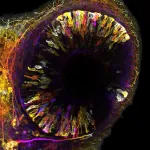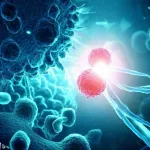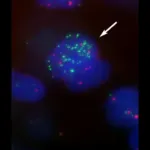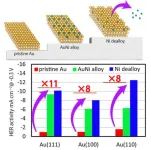(Press-News.org) Brigham researchers are working on a new approach to target autoimmunity in the brain leverages designer bacteria to make treatment safer and more effective
Researchers from Brigham and Women’s Hospital, a founding member of the Mass General Brigham healthcare system, have designed a probiotic to suppress autoimmunity in the brain, which occurs when the immune system attacks the cells of the central nervous system. Autoimmunity in the brain is at the core of several diseases, including multiple sclerosis. In a new study, researchers demonstrated the treatment’s potential using preclinical models of these diseases, finding that the technique offered a more precise way target brain inflammation with reduced negative side effects compared to standard therapies. The results are published in Nature.
“Engineered probiotics could revolutionize the way we treat chronic diseases,” said lead author Francisco Quintana, PhD, of the Ann Romney Center for Neurologic Diseases at Brigham and Women’s Hospital. “When a drug is taken, its concentration in the bloodstream peaks after the initial dose, but then its levels go down. However, if we can use living microbes to produce medicine from within the body, they can keep producing the active compound as its needed, which is essential when we consider lifelong diseases that require constant treatment.”
Autoimmune diseases affect approximately 5-8% of the U.S. population. Despite their widespread prevalence, there are limited treatment options for most of these diseases. Autoimmune diseases that affect the brain, such as MS, are particularly challenging to treat due to their location – many pharmacological therapies can’t effectively access the brain due to the blood-brain barrier, a protective mechanism that separates the brain from the circulatory system.
To look for new ways to treat autoimmune diseases, the researchers studied dendritic cells, a type of immune cell that is abundant in the gastrointestinal tract and in the spaces around the brain. These cells help control the rest of the immune system, but scientists don’t yet know their role in autoimmune diseases. By analyzing dendritic cells in the central nervous system of mice, they were able to identify a biochemical pathway that dendritic cells use to stop other immune cells from attacking the body.
“The mechanism we found is like a brake for the immune system,” said Quintana. “In most of us, it’s activated, but in people with autoimmune diseases, there are problems with this brake system, which means the body has no way to protect itself from its own immune system.”
The researchers found that this biochemical brake can be activated with lactate, a molecule involved in many metabolic processes. The researchers were then able to genetically engineer probiotic bacteria to produce lactate.
“Probiotics are nothing new – we’ve all seen them sold as supplements and marketed as a way to promote health,” said Quintana. “By using synthetic biology to get probiotic bacteria to produce specific compounds relevant to diseases, we can take the benefits probiotics and amp them up to the max.”
They tested their probiotic in mice with a disease closely resembling MS, and they found that even though the bacteria live in the gut, they were able to reduce the effects of the disease in the brain. They did not find the bacteria in the bloodstream of the mice, suggesting that the effect they observed was a result of biochemical signaling between cells in the gut and in the brain.
“We’ve learned in recent decades that the microbes of the gut have a significant impact on the central nervous system,” said Quintana. “One of the reasons we focused on multiple sclerosis in this study was to determine whether we can leverage this effect in treating autoimmune diseases of the brain. The results suggest we can.”
While the current study only examined the effect of the probiotic in mice, the researchers are optimistic that the approach could be readily translated into the clinic because the strain of bacteria they used to create their probiotic has already been tested in humans. The researchers are also working to modify their approach for autoimmune diseases that affect other parts of the body, particularly gut diseases like inflammatory bowel syndrome.
Quintana and colleagues are working to launch a company in collaboration with Mass General Brigham Ventures. As a world-recognized leader in research and innovation, discoveries at Mass General Brigham have led to the creation of hundreds of new companies that have spurred scientific innovation and economic growth across Massachusetts, nation, and globe. These companies enable patients around the world to benefit from Mass General Brigham discoveries.
“The ability to use living cells as a source of medicine in the body has tremendous potential to make more personalized and precise therapies,” said Quintana. “If these microbes living in the gut are powerful enough to influence inflammation in the brain, we’re confident we’ll be able to harness their power elsewhere as well.”
Disclosures: Ning Li, Anna Sokolovska, David Hava and Jose M. Lora were employees of Synlogic Therapeutics during the performance of some of these studies. Additional authors in this manuscript declare no competing financial interests.
Funding: This study was supported by grants from the National Institutes of Health (NS102807, ES02530, ES029136, AI126880, 1K99NS114111, F32NS101790, T32CA207201), the Multiple Sclerosis Society (RG4111A1 and JF2161-A-5), the American Cancer Society (RSG-14-198-01-LIB), the International Progressive MS Alliance (PA-160408459), the German Research Foundation (CRC/TRR167 “NeuroMac.”), the Swedish Research Council ((2021-06735), the National Research Foundation of Korea ((2021R1A6A3A14039088). Further support was provided by fellowships from FAPESP BEPE (2019/13731-0), the European Molecular Biology Organization (ALTF 610-2017 and ALTF: 1009-2021), and the Ministry of Science and Technology, Taiwan (104-2917-I-564-024).
Paper cited: Sanmarco, L. et al. “Lactate limits CNS autoimmunity by stabilizing HIF-1α in dendritic cells” Nature DOI: 10.1038/s41586-023-06409-6
END
Engineered probiotic developed to treat multiple sclerosis
Brigham researchers are working on a new approach to target autoimmunity in the brain leverages designer bacteria to make treatment safer and more effective
2023-08-09
ELSE PRESS RELEASES FROM THIS DATE:
There and back again: how neurons make room for growth in a developing organ
2023-08-09
To function properly, organs require a precise number of cells and a functional architecture, which are established during embryogenesis. Embryos are proficient multitaskers; they grow, and acquire shape and functional architecture all at once. Despite a lot of research on embryo development, scientists do not yetfully grasp how embryos orchestrate all these different tasks in space and time to ensure the formation of healthy organs. This was ...
Oldest extant plant has adapted to extremes and is threatened by climate change
2023-08-09
The rare moss Takakia has adapted over millions of years to a life at high altitudes. An international research team led by Prof. Dr. Ralf Reski from the University of Freiburg and Prof. Dr. Yikun He from the Capital Normal University / China has now discovered exactly how it has developed the ability to survive frost and life-threatening high UV radiation. In the renowned journal Cell, they describe the genetic traits that protect the moss from extreme environmental conditions. At the same time, they document how climate change greatly altered the natural habitat of this highly specialized species within just a few years.
The ...
Drinking alcohol not likely to increase risk of a breast cancer recurrence
2023-08-09
A Kaiser Permanente study provides new information that may help oncologists answer one of the most common questions they hear from breast cancer survivors: Is it safe to drink alcohol?
The new study, published August 9 in Cancer, is the largest prospective study to look at short-term alcohol use after breast cancer. The findings suggest drinking alcohol is not associated with an increased risk of breast cancer recurrence or dying from the disease.
“We know that women who drink alcohol are at increased ...
New machine-learning method may aid personalized cancer therapy
2023-08-09
FOR IMMEDIATE RELEASE
Deep-learning technology developed by a team of Johns Hopkins engineers and cancer researchers can accurately predict cancer-related protein fragments that may trigger an immune system response. If validated in clinical trials, the technology could help scientists overcome a major hurdle to developing personalized immunotherapies and vaccines.
In a study published July 20 in the journal Nature Machine Intelligence, investigators from Johns Hopkins Biomedical Engineering, the Johns Hopkins Institute for Computational Medicine, the Johns Hopkins Kimmel Cancer Center and the Bloomberg~Kimmel Institute for Cancer Immunotherapy show that ...
Childhood cancer: "New" immune system responds better to therapy
2023-08-09
(Vienna, 9.8.2023) Scientists at St. Anna Children's Cancer Research Institute and the Eberhard Karls University of Tübingen have shown that immunotherapy after stem cell transplantation effectively combats certain nerve tumors in children. Crucially, stem cells from a parent provide children with a new immune system that responds much better to immunotherapies. These results of an early clinical trial were published in the prestigious Journal of Clinical Oncology.
Childhood tumors of the nervous system, known as neuroblastomas, are associated with an unfavorable prognosis ...
2024 HFSP Nakasone Award nominations are open
2023-08-09
The Human Frontier Science Program (HFSP) has published the new call for the 2024 HFSP Nakasone Award. Until September 30th, the global scientific community is invited to submit their nominations for this prestigious award.
The HFSP Nakasone Award recognizes groundbreaking contributions and breakthrough discoveries in the life sciences. The award celebrates exceptional achievements in scientific excellence, particularly those that have propelled the boundaries of biological knowledge forward.
In its 13th ...
CAREER Award: Fixing AI’s blind spot in image analysis
2023-08-09
For all the astonishing things artificial intelligence can do, it has a particular blind spot that one University of Virginia researcher seeks to remedy.
It can’t recognize all shapes.
“Current machine-learning models lack the capability to analyze and quantify the shape of objects presented in images with complex structures and large variations, especially in the context of medical imaging,” said Miaomiao Zhang, an assistant professor in the UVA School of Engineering and Applied Science.
The models are biased toward “seeing” image textures and have limited ability ...
The protein protectors of fertility
2023-08-09
Osaka, Japan – You’re likely familiar with RNA, the molecule that plays an important role in protein production and gene expression control. Perhaps you’re less familiar, however, with PIWI-interacting RNA (piRNA), a special type of RNA that protects the genome from mutations. Now, researchers in Japan have shed light on how these critical molecules are formed by the dynamics of several associated proteins in the germline of the fruit fly, Drosophila melanogaster.
In a new study published in the Journal of Cell Biology, researchers from Osaka University have clarified how the proteins Tejas (Tej), Vasa (Vas), and Spindle-E ...
AuNi alloy on Au electrodes for hydrogen evolution reaction: towards a cleaner tomorrow
2023-08-09
In recent years, hydrogen gas has gained momentum as the fuel for a clean and green future. This carbon-neutral fuel source releases huge amounts of energy via combustion in the presence of oxygen with water vapor as the by-product. One of the most popular methods of hydrogen production is the splitting of water into hydrogen and oxygen using electricity.
An electrochemical cell is used to split water, and the hydrogen gas gets released at the negatively charged electrode in hydrogen evolution reaction (HER). Catalysts are used to lower the ...
Sugars in breastmilk could help treat infections, prevent preterm births
2023-08-09
Breastfeeding has long been used as a method to help keep newborns healthy and protected against a variety of diseases. But certain sugars naturally found in breastmilk could also help prevent infections before a baby arrives. Researchers reporting in ACS Central Science have found that these sugars can stop a common prenatal infection in human tissues and pregnant mice. This could someday help avoid preterm births or complications without the need for additional antibiotics.
One of the most common bacteria that can affect pregnancies is Group B streptococcus (GBS). If left untreated, ...
LAST 30 PRESS RELEASES:
Kidney cancer study finds belzutifan plus pembrolizumab post-surgery helps patients at high risk for relapse stay cancer-free longer
Alkali cation effects in electrochemical carbon dioxide reduction
Test platforms for charging wireless cars now fit on a bench
$3 million NIH grant funds national study of Medicare Advantage’s benefit expansion into social supports
Amplified Sciences achieves CAP accreditation for cutting-edge diagnostic lab
Fred Hutch announces 12 recipients of the annual Harold M. Weintraub Graduate Student Award
Native forest litter helps rebuild soil life in post-mining landscapes
Mountain soils in arid regions may emit more greenhouse gas as climate shifts, new study finds
Pairing biochar with other soil amendments could unlock stronger gains in soil health
Why do we get a skip in our step when we’re happy? Thank dopamine
UC Irvine scientists uncover cellular mechanism behind muscle repair
Platform to map living brain noninvasively takes next big step
Stress-testing the Cascadia Subduction Zone reveals variability that could impact how earthquakes spread
We may be underestimating the true carbon cost of northern wildfires
Blood test predicts which bladder cancer patients may safely skip surgery
Kennesaw State's Vijay Anand honored as National Academy of Inventors Senior Member
Recovery from whaling reveals the role of age in Humpback reproduction
Can the canny tick help prevent disease like MS and cancer?
Newcomer children show lower rates of emergency department use for non‑urgent conditions, study finds
Cognitive and neuropsychiatric function in former American football players
From trash to climate tech: rubber gloves find new life as carbon capturers materials
A step towards needed treatments for hantaviruses in new molecular map
Boys are more motivated, while girls are more compassionate?
Study identifies opposing roles for IL6 and IL6R in long-term mortality
AI accurately spots medical disorder from privacy-conscious hand images
Transient Pauli blocking for broadband ultrafast optical switching
Political polarization can spur CO2 emissions, stymie climate action
Researchers develop new strategy for improving inverted perovskite solar cells
Yes! The role of YAP and CTGF as potential therapeutic targets for preventing severe liver disease
Pancreatic cancer may begin hiding from the immune system earlier than we thought
[Press-News.org] Engineered probiotic developed to treat multiple sclerosisBrigham researchers are working on a new approach to target autoimmunity in the brain leverages designer bacteria to make treatment safer and more effective






